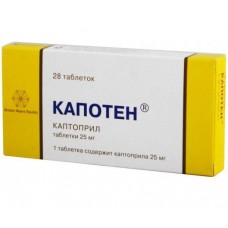Expiration date: 05/2026
Composition and form of release:
1 tablet contains captopril 25 or 50 mg in plastic bottles 40 PCs in a carton.
Pharmacological action:
Blocks ACE and suppresses the formation of angiotensin II.
Pharmacokinetics:
Quickly absorbed. Cmax in the blood is reached after 1 h. 25-30% is bound to plasma proteins, 75% is excreted by the kidneys.
Description of pharmacological action:
Expands peripheral blood vessels, reduces blood PRESSURE, reduces pre-and post-loading on the myocardium, improves blood circulation in the small circle and respiratory function, reduces the resistance of the renal vessels and improves blood circulation in the kidneys.
Indications:
Hypertension, congestive heart failure.
Contraindications:
Hypersensitivity, stenosis of the renal arteries, condition after kidney transplantation, severe renal dysfunction, aortic stenosis.
Use during pregnancy and lactation:
Assign only for strict indications.
Side effect:
In rare cases, epigastric pain, proteinuria, edema, neutropenia, itching, and hyperemia are possible.
Drug interaction:
Compatible with thiazide diuretics, slows down the excretion of lithium, the effect is weakened by NSAIDs. When prescribing potassium-sparing diuretics, the likelihood of hyperkalemia increases.
Dosage and administration:
Doses should be selected by a doctor. Inside, an hour before meals, 25-50 mg 2-3 times a day (but no more than 450 mg per day), for children, the initial dose is 0, 15-0, 3 mg/kg (but no more than 6 mg/kg per day).
Overdose:
It is manifested by a pronounced hypotensive reaction. To normalize blood pressure, a saline solution is administered in/in, and hemodialysis can be used.
Precautionary measures:
In patients who have previously suffered from kidney disease or taking kapoten in doses exceeding 150 mg per day, before the start of treatment and monthly for the first nine months of therapy, protein determination in the urine should be performed. All patients receiving capoten should be alerted about the need to report any signs of infection (sore throat, fever). In case of infection, white blood cells should be counted immediately. If an infection occurs during the first three months of treatment, kapoten should be discontinued until the results of a blood test are available. Since capoten reduces the production of aldosterone, there may be an increase in serum potassium (especially in patients with renal failure). In patients suffering from severe renin-dependent hypertension or severe heart failure and who are on active diuretic therapy, a pronounced hypotensive reaction is observed within one hour after taking the first dose of capoten. In patients suffering from kidney disease, after reducing blood PRESSURE due to taking kapoten in combination with diuretics, the content of blood urea nitrogen and serum creatinine may increase. In this case, you may need to reduce the dose of kapoten, stop taking diuretics, or both. Kapoten should be used with extreme caution for the treatment of patients with aortic stenosis (reduced coronary perfusion due to reduced blood PRESSURE).




